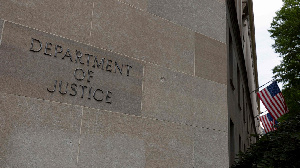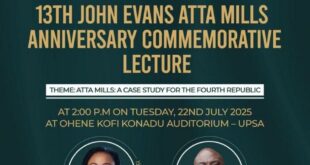• She played a role in ‘sakawa’ which targeted the elderly from about 2014 to 2018
• Deborah Mensah was extradited from Ghana to the US in August 2020
Deborah Mensah, a 34-year-old Ghanaian, has been sentenced by a US Court to 70 months in prison for her role in ‘sakawa’ [conspiracy to launder millions of dollars of fraud proceeds from business email compromises and romance scams] that targeted the elderly from about 2014 through 2018.
Mensah, who was extradited from Ghana to the US on August 21, 2020, pleaded guilty in court on April 2, 2021, before U.S. District Judge Denise L. Cote, to conspiring to commit money laundering.
Audrey Strauss, a Manhattan US Attorney said, “Deborah Mensah was a member of an international criminal enterprise that stole millions of dollars from businesses and vulnerable individuals across the United States, and laundered that money through a network of bank accounts in the Bronx. Having previously been extradited from Ghana, Deborah Mensah has now been sentenced to a term in a U.S. prison for her crime.”
According to her indictment and other public filings in the case published on the US Department of Justice website, sighted by GhanaWeb, Deborah Mensah was a member of a criminal enterprise based in Ghana from about 2014 to about 2018.
They committed a series of business email compromises and romance scams against individuals and businesses located across the United States, including in the Southern District of New York.
They had an objective to use the business email to compromise fraud schemes which was to trick and deceive businesses into wiring funds into accounts controlled by the Enterprise.
The indictment and other public filings in the case further states:
“First, members of the Enterprise created email accounts with slight variations of email accounts used by employees of a victim company or third parties engaged in business with a company to “spoof” or impersonate those employees or third parties. These fake email accounts were specifically designed to trick other employees of the company with access to the company’s finances into thinking the fake email accounts were authentic.
The fake email accounts were used to send instructions to wire money to certain bank accounts and also included fake authorization letters for the wire transfers that contained forged signatures of company employees. By using this method of deception, the Enterprise sought to trick the victims into transferring hundreds of thousands of dollars to bank accounts the victims believed were under the control of legitimate recipients of the funds as part of normal business operations, when in fact the bank accounts were under the control of members of the Enterprise, including Mensah.
The Enterprise conducted the romance scams by using electronic messages sent via email, text messaging, or online dating websites that deluded the victims, many of whom were vulnerable older men and women who lived alone, into believing the victim was in a romantic relationship with a fake identity assumed by members of the Enterprise. Once members of the Enterprise had gained the trust of the victims using the fake identity, they used false pretenses to cause the victims to wire money to bank accounts the victims believed were controlled by their romantic interests, when in fact the bank accounts were controlled by members of the Enterprise, including Mensah.
At times, the members of the Enterprise also used false pretenses to cause the victims to receive funds into the victims’ bank accounts, which, unbeknownst to the victims, were fraud proceeds, and to transfer those funds to accounts under the control of members of the Enterprise. The members of the Enterprise, posing as the romantic interest of the victims, also introduced the victims to other individuals purporting to be, for example, consultants or lawyers, who then used false pretenses to cause the victims to wire money to bank accounts controlled by members of the Enterprise.
Mensah and her co-conspirators received or otherwise directed the receipt of over $10 million in fraud proceeds from victims of the Enterprise into bank accounts that she and other members of the Enterprise controlled in the Bronx, New York. Mensah opened and maintained multiple business bank accounts in the name of an auto sales company to receive funds stolen from victims and launder them to co-conspirators based primarily in Ghana. She also recruited and directed one co-conspirator to receive and launder fraud proceeds and instructed that co-conspirator on how to set up a business bank account for this purpose to avoid detection.”
Deborah Mensah, the US Department of Justice says, was also sentenced to three years of supervised release and was ordered to forfeit $202,964 and pay restitution of $1,505,519 to victims.
“Other defendants in this case who have been sentenced include Muftau Adamu, a/k/a “Muftau Adams,” a/k/a “Muftau Iddrissu,” 32, of the Bronx, New York, who was sentenced to 51 months in prison on June 7, 2019; Tourey Ahmed Rufai, a/k/a “Joe Thompson,” a/k/a “Joe Terry,” a/k/a “Rufai A Tourey,” a/k/a “Ahmed Rufai Tourey,” 34, of the Bronx, New York, who was sentenced to 48 months in prison on April 12, 2019; Prince Nana Aggrey, 45, of the Bronx, New York, who was sentenced to 30 months in prison on May 10, 2019; and Assana Traore, 41, of the Bronx, New York, who was sentenced to 15 months in prison on October 8, 2019. Adamu, Rufai, and Aggrey each pled guilty to one count of conspiracy to commit wire fraud, and Troare pled guilty to one count of conspiracy to receive stolen money. Each of the defendants was sentenced by Judge Cote.”
 Home Of Ghana News Ghana News, Entertainment And More
Home Of Ghana News Ghana News, Entertainment And More





